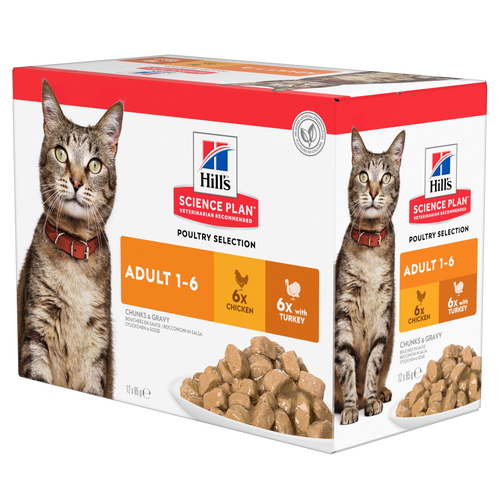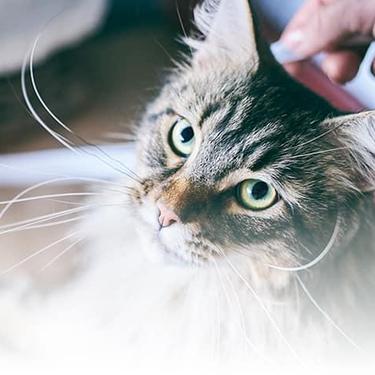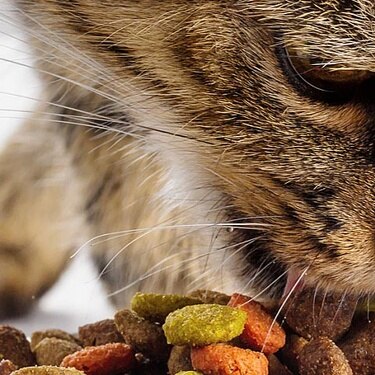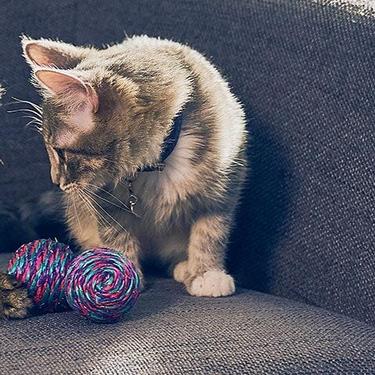
-
Find the right food for your petTake this quiz to see which food may be the best for your furry friend.Find the right food for your petTake this quiz to see which food may be the best for your furry friend.Featured products
 Adult Wet Dog Food with Beef
Adult Wet Dog Food with BeefHill's Science Plan Adult Multipack Wet Dog Food with Chicken, Beef & Turkey are complete premium pet foods for adult dogs from 1 year. Your dog will love these deliciously smooth and savoury minced loaves, formulated for balanced nutrition and overall health.
Shop Now Puppy Food
Puppy FoodHill's Science Plan Puppy Multipack Wet Dog Food with Chicken & Beef are complete premium pet foods for growing puppies from weaning until 1 year old and for pregnant and nursing dogs. Your puppy will love these deliciously smooth and savoury minced loaves, formulated for balanced nutrition and overall health.
Shop Now Mature Adult Dog Food
Mature Adult Dog FoodHill's Science Plan Mature Adult Multipack Wet Dog Food with Chicken & Beef are complete premium pet foods for mature adult dogs from 7 years. Your dog will love these deliciously smooth and savoury minced loaves, formulated to deliver the appropriate amount of energy to support the needs of adult dogs.
Shop NowFeatured products Light Adult Multipack Wet Cat Food with Chicken & Ocean Fish
Light Adult Multipack Wet Cat Food with Chicken & Ocean FishTender chicken chunks in gravy for cats, with L-carnitine and fewer calories for ideal weight management. Packed with high-quality protein, omega-6s, and vitamin E for shiny fur and healthy skin.
Shop Now Adult Multipack Wet Cat Food with Beef, Ocean Fish & Chicken
Adult Multipack Wet Cat Food with Beef, Ocean Fish & ChickenTender chunks in gravy for cats, with high-quality protein to maintain lean muscle. With vitamin E and omega-3s & -6s for healthy skin and balanced minerals to support healthy vital organs.
Shop Now Mature Adult Wet Cat Food with Chicken
Mature Adult Wet Cat Food with Chicken
Tender chicken chunks in gravy for mature adult cats. Made with easy-to-digest ingredients, high-quality protein for lean muscle maintenance and antioxidant vitamins C+E for optimal health.
Shop Now -
Dog
- Dog Tips & Articles
-
Health Category
- Weight
- Food & Environmental Sensitivities
- Urinary
- Digestive
- Joint
- Kidney
-
Life Stage
- Puppy Nutrition
- Adult Nutrition
- Senior Nutrition
Cat- Cat Tips & Articles
-
Health Category
- Weight
- Skin & Food Sensitivities
- Urinary
- Digestive
- Kidney
-
Life Stage
- Kitten Nutrition
- Adult Nutrition
Featured articles The Incredible Science Behind Your Pet's Microbiome
The Incredible Science Behind Your Pet's MicrobiomeLearn what your pet's microbiome is, how it contributes to your pet's gut and overall health, and why nutrition is important in maintaining healthy microbiomes.
Read More Show some love with wet foods: a great choice for pets with health issues
Show some love with wet foods: a great choice for pets with health issuesShow some love with wet foods: a great choice for pets with health issues.
Read More The Right Diet For Your Pet
The Right Diet For Your PetIn people, the right diet is very important. If you are eating the wrong way for your metabolism, activity level, age and lifestyle you could end up with health issues.
Read More -


Decorating your home for Christmas gets your whole family in the festive spirit, but it's important to be aware of plants that are dangerous for cats.
It's hard to resist decking the halls with the stunning live plants that are plentiful at this time of year. Unfortunately, some of the most popular Christmas flora are harmful and even poisonous for cats. Avoid these common Christmas plants to ensure a safe festive time for your cat.
Poinsettia
It seems that no Christmas table is complete without a beautiful poinsettia with its dark leaves and velvety red petals. This plant has received a bad rap over the years as being a highly toxic plant for cats, but it's not as dangerous as others, says PetMD. Poinsettias aren't life-threatening, but they may give your cat a stomach ache or diarrhoea, if they ingest or lick the plant. Display the plant out of your cat's reach (if there is such a place in your home!) or choose a faux option that can bring your Christmas display to life without threatening your cat.


Tasty Tips
Christmas Tree

Pine trees are toxic for cats, notes Petcha, because they may cause liver damage and can be fatal. If you wish to have a live tree, choose a fir or spruce. You should regularly dispose of any stray needles–no matter the tree type–because they're sharp and may be dangerous to your cat’s internal organs. Cover the tree stand so your cat can't drink the water. As with artificial trees, other common hazards include your cat knocking the tree over or ingesting harmful decorations like tinsel, ribbons, string and beads. Cats can be very mischievous and see all the twinkling lights as opportunities to explore, and nothing is more enticing than the opportunity to climb a tree inside their home. It is always best to secure the tree to the floor to avoid your cat knocking it over and injuring themselves or others. As far as ornaments and other tree decorations go, make sure they are not so small that they can be ingested and try to avoid any that contain sharp objects. Try your best to tie your ornaments on the tree so that your cat is not tempted to try and take them off. Finally, make sure you unplug your lights when you're not around to help avoid your cat being accidentally electrocuted.
Mistletoe and Holly
If you're looking to hang mistletoe or holly in your doorway, you'll have to go for artificial plant route. PetMD warns, "Ingestion of small quantities of the leaves or berries may only cause stomach upset, however, larger exposures may result in cardiovascular compromise and may be life-threatening." So avoid mistletoe and holly completely. Even if the decorations look like they're out of reach of your cat, think again. Cats are nimble, curious little creatures, so they'll find a way to reach them.
Amaryllis
The amaryllis is a desirable Christmas plant because it's fun to watch the bulb grow into a tall, majestic flower. However, it's a very toxic plant for cats (and dogs) due to the presence of the chemical lycorine. According to the American Society for the Prevention of Cruelty to Animals, possible reactions include vomiting, diarrhoea, and tremors. Don't bring this plant into your home.
Familiarise yourself with other potentially harmful or toxic plants, suggests VCA Animal Hospitals. Lilies, for example, are extremely dangerous for cats and are often included in flower bouquets. If your cat ingests a toxic plant, contact a veterinarian immediately.
Fortunately, you can buy gorgeous artificial plants that will liven up your home just as beautifully as the real ones. Just be sure that decorations don't contain easily detachable small parts that your cat could swallow.
If you have a particularly investigative cat, find other ways to distract them from your Christmas décor, try a new scratching post or cat toy; provide a cat tree of their very own to climb, so they are not tempted to climb your tree.
By avoiding dangerous plants for cats you'll ensure that your cat enjoys a Happy Christmas, too!


Christine O'Brien is a writer, mom, and long-time cat parent whose two Russian Blues rule the house. Her work also appears in Care.com, What to Expect, and Fit Pregnancy, where she writes about pets, pregnancy, and family life. Find and follow her on Instagram and Twitter @brovelliobrien.
Related products

Tender chunks in gravy for cats, with high-quality protein to maintain lean muscle. With vitamin E and omega-3s & -6s for healthy skin and balanced minerals to support healthy vital organs.

Tender chicken chunks in gravy for mature adult cats. Made with easy-to-digest ingredients, high-quality protein for lean muscle maintenance and antioxidant vitamins C+E for optimal health.


Tender chicken chunks in gravy for cats, with L-carnitine and fewer calories for ideal weight management. Packed with high-quality protein, omega-6s, and vitamin E for shiny fur and healthy skin.
Related articles

Learn how to make homemade cat treats that are healthy for your pet with this recipe from Hills Pet Nutrition.

From essential vitamins & minerals to different types of meat, learn what to look for when choosing the best cat food for your feline.

There are three common ways to feed a cat. Each way has its advantages and disadvantages.

Kittens grow a lot in their first year, so it is important to provide them with the proper nutrients early, so they grow up healthy and strong. Learn more.

Put your cat on a diet without them knowing
Our low calorie formula helps you control your cat's weight. It's packed with high-quality protein for building lean muscles, and made with purposeful ingredients for a flavourful, nutritious meal. Clinically proven antioxidants, Vitamin C+E, help promote a healthy immune system.
Put your cat on a diet without them knowing
Our low calorie formula helps you control your cat's weight. It's packed with high-quality protein for building lean muscles, and made with purposeful ingredients for a flavourful, nutritious meal. Clinically proven antioxidants, Vitamin C+E, help promote a healthy immune system.

